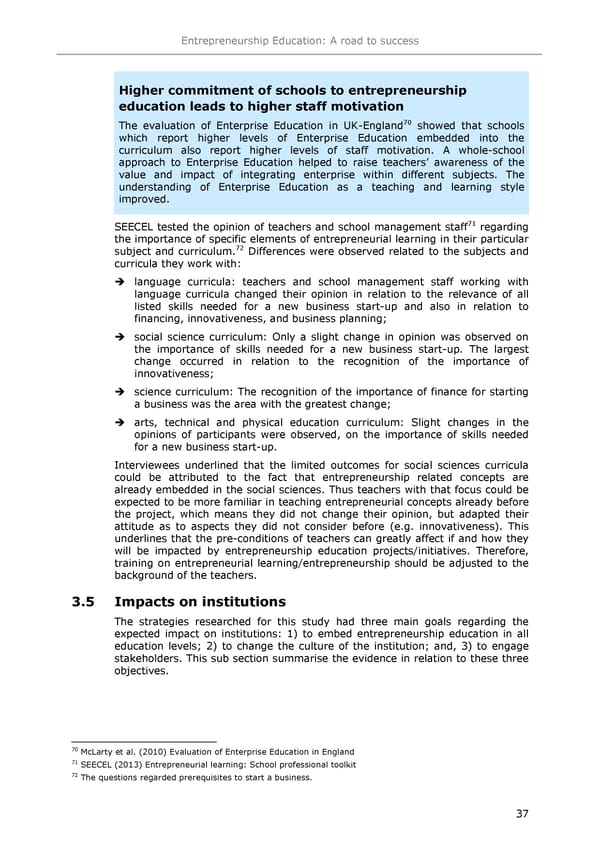Entrepreneurship Education: A road to success Higher commitment of schools to entrepreneurship education leads to higher staff motivation 70 The evaluation of Enterprise Education in UK-England showed that schools which report higher levels of Enterprise Education embedded into the curriculum also report higher levels of staff motivation. A whole-school approach to Enterprise Education helped to raise teachers9 awareness of the value and impact of integrating enterprise within different subjects. The understanding of Enterprise Education as a teaching and learning style improved. SEECEL tested the opinion of teachers and school management staff71 regarding the importance of specific elements of entrepreneurial learning in their particular 72 subject and curriculum. Differences were observed related to the subjects and curricula they work with: language curricula: teachers and school management staff working with language curricula changed their opinion in relation to the relevance of all listed skills needed for a new business start-up and also in relation to financing, innovativeness, and business planning; social science curriculum: Only a slight change in opinion was observed on the importance of skills needed for a new business start-up. The largest change occurred in relation to the recognition of the importance of innovativeness; science curriculum: The recognition of the importance of finance for starting a business was the area with the greatest change; arts, technical and physical education curriculum: Slight changes in the opinions of participants were observed, on the importance of skills needed for a new business start-up. Interviewees underlined that the limited outcomes for social sciences curricula could be attributed to the fact that entrepreneurship related concepts are already embedded in the social sciences. Thus teachers with that focus could be expected to be more familiar in teaching entrepreneurial concepts already before the project, which means they did not change their opinion, but adapted their attitude as to aspects they did not consider before (e.g. innovativeness). This underlines that the pre-conditions of teachers can greatly affect if and how they will be impacted by entrepreneurship education projects/initiatives. Therefore, training on entrepreneurial learning/entrepreneurship should be adjusted to the background of the teachers. 3.5 Impacts on institutions The strategies researched for this study had three main goals regarding the expected impact on institutions: 1) to embed entrepreneurship education in all education levels; 2) to change the culture of the institution; and, 3) to engage stakeholders. This sub section summarise the evidence in relation to these three objectives. 70 McLarty et al. (2010) Evaluation of Enterprise Education in England 71 SEECEL (2013) Entrepreneurial learning: School professional toolkit 72 The questions regarded prerequisites to start a business. 37
 Entrepreneurship Education Page 40 Page 42
Entrepreneurship Education Page 40 Page 42